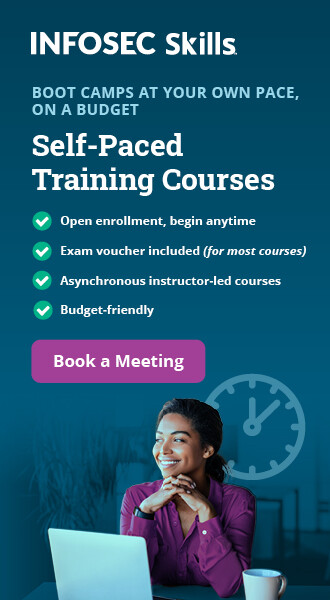10 tips to get federal funding approval for training
Gaining training approval from your government agency isn’t always easy. Training budgets for the fiscal year are tight and often have limited resources available. Here at Infosec, we’ve helped IT and security teams navigate those challenges and secure federal funding for more than 15 years.
Follow these 10 tips to increase your chances of getting your training approved.
FREE role-guided training plans

1. Make a written training plan
Presenting a well-thought-out plan demonstrates you’re serious about training. Detail how the training benefits you and your team and, most importantly, provides a return on investment (ROI) for your agency.
2. Schedule dedicated time with your supervisor
Set aside time to discuss your training plan. Keep the conversation focused on the benefits you outlined above, and don’t get distracted by other ongoing business issues. Get the meeting on the calendar — even if it’s just 15 minutes.
3. Talk to co-workers and professional colleagues
It’s often easier to gain buy-in when a group wants to attend training. Infosec has aggressive multi-student discounts on top of government rates, so your agency will save even more money if you train as a group.
4. Find out the approval process
Many government agencies have dedicated training staff and a purchasing department that will need to approve training requests. Understand the process and try to get buy-in from these important groups ahead of time.
5. Find out your training budget
If you have a set budget, work with Infosec to get a class that aligns with your allocated funding. If the training budget is insufficient, raise this issue with your procurement department. It may help budget planning for the next fiscal year.
6. Consider alternate course formats for certification
Enroll in a live online boot camp, join an in-person course at the location of your choice or host live training at your office. Group training sessions enable your entire team to train for the lowest cost per student.
7. Highlight the value of new skills
Demonstrate ROI to your agency by highlighting the skills you will acquire and the value you will immediately add. Many of our courses have hands-on labs, where you will practice and learn exactly what you will be doing the day you return to work from training.
8. Highlight the value of new certifications
Demonstrate ROI to your agency by highlighting how you will meet certification requirements. Many of our courses prepare you for a specific certification, which can be important for internal compliance, contractors, senior management and end-of-year progress improvement reports.
9. Get help from your Infosec representative
If you encounter any issues getting approval, report them back to your Infosec Federal Account Executive. We train over 10,000 students every year, and we know how to assist you with almost any issue, whether it’s pricing, budget, location or something else.
10. Don’t give up!
Remember the old adage: The squeaky wheel gets the grease! If you don’t get approval, stay persistent and try again in the future. In the end, it’s up to you to keep your skills current and stay compliant within your agency — and you should be your number one advocate.
FREE role-guided training plans

Learn more about Infosec’s federal government and contractor training options.



